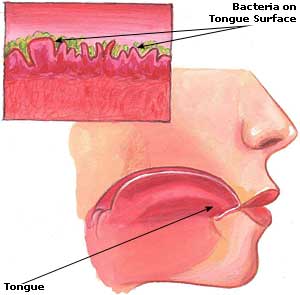This may become a two part blog, but for now we’ll focus on the matter at hand, or should I say at mouth. Whether it is morning, coffee, or smoker breath there always seems to be one person you encounter daily that has awful breath. Living in such close quarters with many new people, it can be difficult to deal with change, especially if that change involves adjusting to their natural smells. Luckily, my roommates are very cleanly but, we’ve all heard the horror stories of the less than hygienic roommate. So today, let’s tackle some common causes of bad breath, or medically referred to as halitosis. Halitosis can be broken down into three main areas which will be sorted out below.
You are what you eat:
An obvious cause of bad breath is what a person puts in his or her mouth. Different foods lodge in teeth easily, and as the particles remain, the bacteria grow and so does the scent. Another food issue is the more potent foods such as onions, garlic, vegetables, and spices. The Mayo Clinic website elaborates that “After you digest these foods, they enter your bloodstream, are carried to your lungs and affect your breath.” So even after brushing away the garlic in your mouth, the scent can remain, being as it goes through your lungs. Another breath issue is oral tobacco use. Smokers along with chewing tobacco users often have very bad breath because it can cause gum disease which leads to halitosis.
Hygiene:
Dental hygiene is so vital in avoiding halitosis. If a person does not brush daily, then a “sticky film of bacteria (plaque) forms on your teeth and if not brushed away, plaque can irritate your gums (gingivitis and eventually form plaque-filled pockets between your teeth and gums (periodontitis). People also need to brush their tongues being as there are ridges on tongues that can hold very small food fragments.
Different “stinkifying” diseases:
Dry mouth can cause stinky breath because “saliva helps cleanse your mouth.” Xerostomia is “a condition called dry mouth” which “can contribute to bad breath because production of saliva is decreased.” Morning breath is caused by a lack of saliva since saliva production is slowed during sleep. If a person has oral surgery, sometimes their wounds can smell. Lastly, there is the possibility of “small stones that form in the tonsils and are covered with bacteria that produce odorous chemicals.” Postnasal drip can also cause halitosis.
Bad breath is not just a little yucky; it can also be medically induced. What people need to keep in mind while living in such close proximity with many strangers is to brush their teeth often, and to use gum and mouthwash. If you are having a problem with tooth decay or disease, it is important to talk to your dentist. Halitosis should not be ignored, because it can point to something larger. And remember to always be a pal; smell something, say something! Don’t just let your buddy walk around offending people’s nostrils.

Sources:
http://www.mayoclinic.org/diseases-conditions/bad-breath/basics/causes/con-20014939
